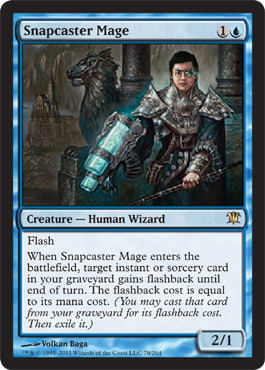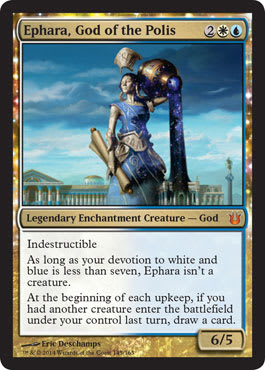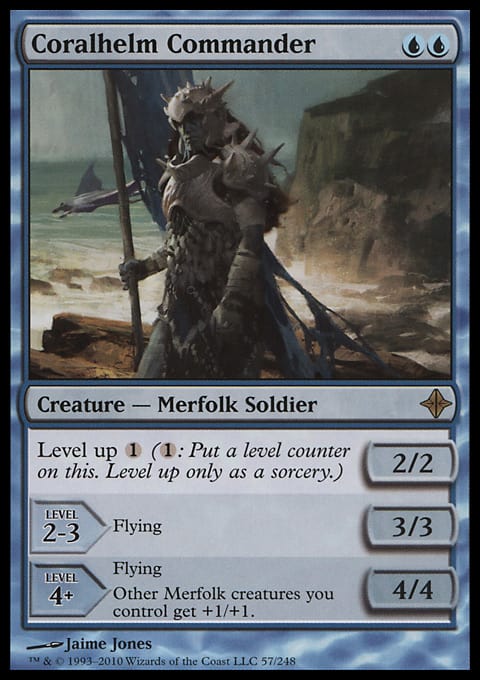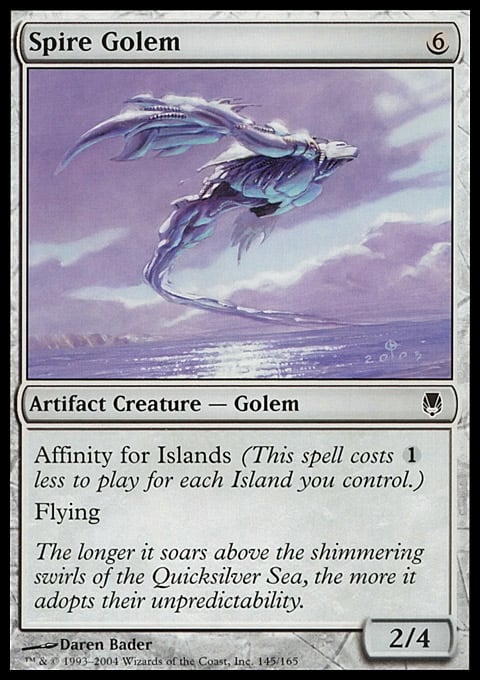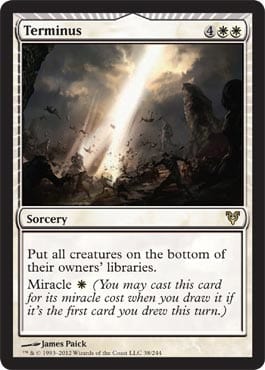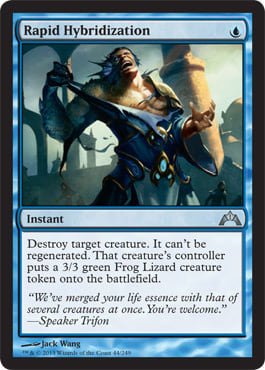I’m not as good as I think I am. True story.
In fact, there are matches where I’m downright terrible.
There was a time when it was fashionable to do a “Magic inventory,” or, essentially, a list of ways people wanted to improve their games and, always by some sort of odd extension, their lives. I’m not going to subject you to the latter today (because my life is awesome), but a recent losing streak does have me reconsidering my Magic game. It has me contemplating all the ways in which I’m terrible.
Sure, it might have just been that I haven’t really been doing much attacking with creatures lately (or, heck, even casting them if they’re not named Snapcaster Mage or Aetherling), but I went 1–2 at Friday Night Magic with U/w Devotion and then followed up that stellar performance with a 1–2 showing at a Modern tournament the next day with Merfolk.
I never, ever, go 1–2 at local tournaments. That’s not a humblebrag—because most of the time I play at least two matches against eight-year-olds or players trying out their defender decks because, ya know, local tournaments—but it definitely was a bit trying to Squire two straight tournaments.
So, by way of therapy, and to maybe let you see some of your own bad habits in my written reflection, I took stock of ways in which I’m terrible.
But first, about those tournaments—
Mini-Tournament Break Report Fantastic!
So here’s the quick-and-dirty version of my Friday failure. I decided to sleeve up U/w Devotion because I really like Ephara, God of the Polis and was moderately tired of casting Sphinx's Revelation (moderately). I had Blue Devotion built and had the Epharas in my binder, so I ran with it—headlong into Brave the Elements.
You see, after dispatching a Boros Burn deck in Round 1 (and even that wasn’t as easy as it should have been), I was summarily dispatched by two White Weenie decks, which, apparently, aren’t good matchups. Frustratingly, I was blown out by Brave the Elements in four straight games in which any other spell would have resulted in a blowout in the other direction. I knew it existed, couldn’t play around it, and got wrecked . . . in four straight games.
Fun.
There were other issues (we’ll get to those), but that’s certainly the tl;dr of that tournament. So maybe wanting some kind of karmic payback or maybe just being slightly tired of always playing Cruel Control, I put together Merfolk and jammed it to the same 1–2 record, but at least this one felt as though it was all my fault. I missed an onboard kill and a point of damage that ended up mattering while playing against W/U Tron, I beat a Modern Charbelcher deck (which exists, I guess), and then promptly lost to R/W/U Control because he drew all of the removal and Snapcasters and because I don’t own Spellskites.
Oops.
So, where did I go wrong?
It turns out the answer is that I went wrong in many, many places. And not just that weekend.
I Shave Lands When I Shouldn’t
That Blue Devotion deck was short a land, no bones about it. I wanted to play too many spells and ended up cutting both a land (to run twenty-four) and fewer 1-drops, reasoning that the deck was a bit slower anyway, so I could afford to throttle back slightly.
But the result was that the finely-balanced engine that is the Blue Devotion deck needs all of its moving parts, and removing those particular sprockets sent the mechanisms spinning wildly out of control. I missed land drops. I missed white sources. I was out-tempo’d with the format’s premier tempo deck.
And I do this all the time. The first drafts of Cruel Control had twenty-five lands plus Serum Visions, because, hey, more cantrips finds more lands, right? Forget that Serum Visions was just bad in the deck; I just didn’t want to play more lands.
I do the same thing in Limited, rarely willing to stray from seventeen lands. I’ve had several Cube decks that should have gone a different direction, but out of slavish devotion to form, I’ve stuck with seventeen lands.
Instead, what I should be doing is the math and the analysis instead of taking the offhand shortcuts for how many lands I should play. Speaking of shortcuts . . .
I Rush
I tend to pride myself on playing quickly, especially with control decks. I do this all the time, to the point that I sometimes play as though I’m a little ADD, and my opponents sometimes feel the need to apologize for “taking so long,” when, really, they aren’t.
Take the Round 1 loss in Modern against Tron. I had a 3/3 Coralhelm Commander, and my opponent was at 3. He had some cards in hand, but I had to make him have it. So I attacked. He animated a Celestial Colonnade that I just hadn’t considered, and feeling dumb, I dumped my Commander into the ’yard.
. . . Only to immediately notice that I had Thassa, God of the Sea in play and could have made the Merfolk unblockable. He went on to win that game.
In the third game, I made a similar mistake. I had two Tidebinder Mages in play and a Thassa, and he attempted to Path to Exile my Thassa. I had kept in a couple Vapor Snags to bounce stuff in response to removal, and I bounced one of the Mages, keeping Thassa in play and setting up a bunch of damage the following turn. It was a strong play.
Sensing weakness and hearing my opponent say, “I’m just dead I think,” I drew my hand and saw Lord of Atlantis. I immediately dumped Tidebinder Mage and the Lord into play and turned everything but the Lord sideways.
“Um, Tidebinder doesn’t have haste.”
Of course it doesn’t. In my rush both to gain devotion and to make my dudes bigger, I had needlessly played a second creature when I only needed one to turn on devotion. I knew he didn’t have a second Path (or else he would have used it in response to Vapor Snag) and that his only out was a Wrath of some kind. Had I stopped to think for a second, I would have realized he was on a two-turn clock no matter what I did and that I should hold one of the ![]()
![]() creatures so I could potentially turn on Thassa if Wrath happened. I didn’t, Supreme Verdict happened, and I never recovered.
creatures so I could potentially turn on Thassa if Wrath happened. I didn’t, Supreme Verdict happened, and I never recovered.
All it would have taken was a second to stop and think, and I probably would have won both of those games. But I rush all the time—it’s nothing new, but it’s something I need to work on.
I Rarely Stray from Islands
On the occasions that I give up the high seas for greener, darker, or other fare, I usually do so in ways that mimic blue decks. A Junk deck I built early after Theros was released featured Read the Bones as a Divination proxy. All of my Commander decks save one—something like eleven total out of dozen—all play blue. My favorite cards of all time are Gifts Ungiven, Cruel Ultimatum, Cryptic Command, Snapcaster Mage, and Greater Good—even the green card on that list draws cards.
But if I want to become better, I need to venture outside that comfort zone more often. My friend Tyler has rightfully pointed out that I don’t know how to be aggressive when the game calls for it, and that’s often true and a symptom of my Spire Golem nature.
If I want to become better with Merfolk, I need to be able to play Zoo and Red Deck Wins and White Weenie and Affinity. If I want to play Blue Devotion, I need to better understand the blowout that is Brave the Elements. If I want to attack, I’m going to have to learn to leave my flotilla from time to time.
I’m Not as Smart as I Think I Am
I’ve been playing a long time, and as such, I know a lot about what cards do. But I often make mistakes that would be resolved if I just stopped and made sure I’m as smart as I think I am.
Hint: I’m not.
For instance, in drafting a friend’s Cube, I thought I had the nuttiest of nut artifact decks, with synergies and mechanisms so astounding Tezzeret himself would be impressed.
But I got a little too ahead of myself with the card Ethersworn Shieldmage when I attacked into my opponent’s board that included, among other things, a 5/5 creature that also happened to be an artifact. Because it had never really come up for me, I just assumed Shieldmage only prevented damage done to my creatures. If that were the case, I would have won handily. Instead, he was able to keep his 5/5, and he turned the tables on me pretty quickly.
If I had just checked Shieldmage quickly to make sure I was remembering it right, I could have taken a different line and won running away.
I Don’t Do Enough of This
After my Friday match, I quickly summed up my night to people by saying, “I couldn’t beat Brave the Elements.” Even my opponents accepted this “logic,” especially after I won the test games after the match that didn’t feature the 1-mana instant. In my mind, I lost because of circumstances beyond my control, because my opponent had a card when it could have been another one instead.
I do this a lot in Cube, where I become exasperated far too often when opponents have “the one out in the entire Cube.” Given the number of times I think that, I doubt it’s true more than ten percent of the time, but I think it anyway. These are the times I say, “Of course he had Terminus against my otherwise-unkillable Thrun,” or, “The only card I lose to here is exactly Sword of War and Peace.”
I say crap like that a lot, even though I know it’s not true most of the time.
You see, most of the time, players are actually playing the game. True story. So when an opponent has “exactly” what he or she needs to win, that is, often enough, a function of the player both having that particular thing and aiming the game in a direction in which that particular thing matters.
Sure, sometimes a top-deck matters and swings a game, but those happen in my favor as well. But what I need to start doing is considering the other aspects.
For example, I was particularly bothered that my opponent in one round drew Banisher Priest and had exactly 4 mana to use it and Brave the Elements when I had Rapid Hybridization to free Thassa and wreck his attack. But I was only in that position because my mana hadn’t been cooperating and I hadn’t been able to mount much of a board position in the first place. If I had a land in the deck (which was what Rapid Hybridization replaced), I would have had a better board and wouldn’t have necessarily needed Hybridization to even resolve in order to have favorable blocks.
Or in the Terminus game, if I had drafted a better deck and not stuck myself with a pile of creatures that don’t do anything, I wouldn’t have had to lean so heavily on Thrun, the Last Troll and might have had a chance.
Yes, it sometimes really is as simple as, “Well, my opponent drew X,” but more often than not, there’s more to the story.
I Don’t Handle Losing Well
I’ve written about this before, and I’ve only made marginal improvements in this area. I hold back my gripes and snipes better than I used to and now only seethe internally. What I need to improve at now is not seething at all and just enjoying the game, win or lose, Brave the Elements or no.
















